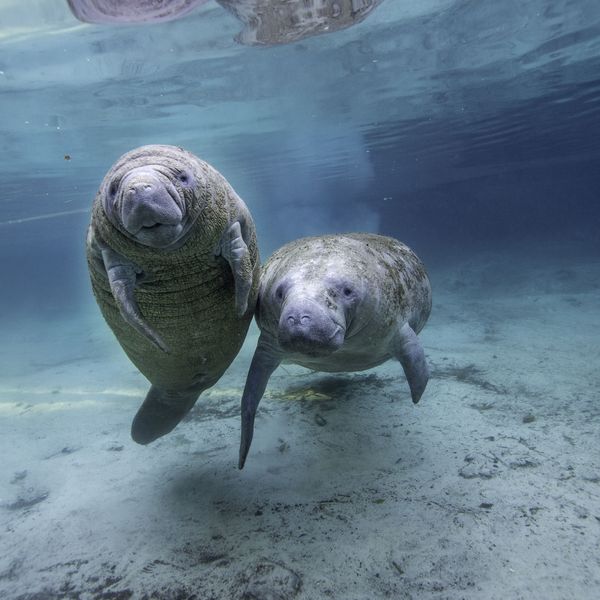
A Florida panther is seen in Sunshine Acres, Florida on May 3, 2021.
US Court Strikes Down Florida's 'End Run Around the Endangered Species Act'
"Requiring agencies to follow the law is a win for wildlife, protecting habitat and the public alike," said one advocate.
A federal court ruling will restore "essential guardrails provided by the Endangered Species Act," said one wildlife advocacy group on Thursday, as the court found that under former Republican President Donald Trump, federal agencies broke the law when they allowed Florida's right-wing government to take over wetlands permitting.
The U.S. District Court for the District of Columbia found that the Environmental Protection Agency (EPA) and the U.S. Fish and Wildlife Service (FWS) "made an end run around the Endangered Species Act," said the Center for Biological Diversity (CBD) when they greenlighted Florida Gov. Ron DeSantis' proposal to allow the state to fast-track construction permits for projects on wetlands.
Under Section 404 of the Clean Water Act, states can take over wetlands permitting if they can prove that they will not violate wildlife protections.
Shortly after the EPA transferred the authority to Florida in 2020, CBD was joined by groups including Defenders of Wildlife, the Sierra Club, and Miami Waterkeeper in suing the agency.
This past December, environmental legal group Earthjustice requested a preliminary injunction on behalf of CBD and the Sierra Club to stop Florida from issuing state permits for development projects near the Florida Panther National Wildlife Refuge, where an estimated 120-230 endangered panthers "remain in their last territory on Earth," according to CBD.
The FWS found that the projects were likely to kill between seven and 26 panthers each year as they were pushed out of their habitat and became vulnerable to car collisions on nearby roads, while another three panthers would be otherwise harmed by the habitat loss each year.
“We're talking about the destruction of some of the last remaining habitat for one of the most endangered animals in the world," said Earthjustice attorney Bonnie Malloy on Thursday. "Restoring the Endangered Species Act protections will ensure that these projects get the analysis and review Congress intended to protect threatened and endangered species."
The court ruled on the groups' underlying claim that the EPA's transfer of the authority would violate federal endangered species protections, rather than just issuing a preliminary injunction.
Elise Bennett, Florida and Caribbean director at CBD, called the ruling "a reprieve for critically endangered species like the Florida panther," but warned that "we'll never prevent the extinction of our most vulnerable wildlife unless we stop bulldozing the wild places where they live."
"The Endangered Species Act can save these magnificent creatures, but only if our agencies follow the law. We'll continue to fight sprawling developments that rip apart the precious wetlands and interconnected natural spaces that Florida's most imperiled wildlife need to survive," said Bennett.
Florida Phoenix columnist Craig Pittman called the ruling "huge news for Florida's wetlands, because DeSantis' [Department of Environmental Protection] never said no to a developer."
Elizabeth Fleming, senior Florida representative at Defenders of Wildlife, said that "wetlands are the lifeblood of Florida, providing essential habitat to the world's only population of the critically endangered Florida panther and many other rare and endemic species, all found within one of the most biologically diverse states in the country."
"Requiring agencies to follow the law is a win for wildlife," she said, "protecting habitat and the public alike, as protecting our wetlands also protects drinking water and ecosystems across the state."
An Urgent Message From Our Co-Founder
Dear Common Dreams reader, The U.S. is on a fast track to authoritarianism like nothing I've ever seen. Meanwhile, corporate news outlets are utterly capitulating to Trump, twisting their coverage to avoid drawing his ire while lining up to stuff cash in his pockets. That's why I believe that Common Dreams is doing the best and most consequential reporting that we've ever done. Our small but mighty team is a progressive reporting powerhouse, covering the news every day that the corporate media never will. Our mission has always been simple: To inform. To inspire. And to ignite change for the common good. Now here's the key piece that I want all our readers to understand: None of this would be possible without your financial support. That's not just some fundraising cliche. It's the absolute and literal truth. We don't accept corporate advertising and never will. We don't have a paywall because we don't think people should be blocked from critical news based on their ability to pay. Everything we do is funded by the donations of readers like you. Will you donate now to help power the nonprofit, independent reporting of Common Dreams? Thank you for being a vital member of our community. Together, we can keep independent journalism alive when it’s needed most. - Craig Brown, Co-founder |
A federal court ruling will restore "essential guardrails provided by the Endangered Species Act," said one wildlife advocacy group on Thursday, as the court found that under former Republican President Donald Trump, federal agencies broke the law when they allowed Florida's right-wing government to take over wetlands permitting.
The U.S. District Court for the District of Columbia found that the Environmental Protection Agency (EPA) and the U.S. Fish and Wildlife Service (FWS) "made an end run around the Endangered Species Act," said the Center for Biological Diversity (CBD) when they greenlighted Florida Gov. Ron DeSantis' proposal to allow the state to fast-track construction permits for projects on wetlands.
Under Section 404 of the Clean Water Act, states can take over wetlands permitting if they can prove that they will not violate wildlife protections.
Shortly after the EPA transferred the authority to Florida in 2020, CBD was joined by groups including Defenders of Wildlife, the Sierra Club, and Miami Waterkeeper in suing the agency.
This past December, environmental legal group Earthjustice requested a preliminary injunction on behalf of CBD and the Sierra Club to stop Florida from issuing state permits for development projects near the Florida Panther National Wildlife Refuge, where an estimated 120-230 endangered panthers "remain in their last territory on Earth," according to CBD.
The FWS found that the projects were likely to kill between seven and 26 panthers each year as they were pushed out of their habitat and became vulnerable to car collisions on nearby roads, while another three panthers would be otherwise harmed by the habitat loss each year.
“We're talking about the destruction of some of the last remaining habitat for one of the most endangered animals in the world," said Earthjustice attorney Bonnie Malloy on Thursday. "Restoring the Endangered Species Act protections will ensure that these projects get the analysis and review Congress intended to protect threatened and endangered species."
The court ruled on the groups' underlying claim that the EPA's transfer of the authority would violate federal endangered species protections, rather than just issuing a preliminary injunction.
Elise Bennett, Florida and Caribbean director at CBD, called the ruling "a reprieve for critically endangered species like the Florida panther," but warned that "we'll never prevent the extinction of our most vulnerable wildlife unless we stop bulldozing the wild places where they live."
"The Endangered Species Act can save these magnificent creatures, but only if our agencies follow the law. We'll continue to fight sprawling developments that rip apart the precious wetlands and interconnected natural spaces that Florida's most imperiled wildlife need to survive," said Bennett.
Florida Phoenix columnist Craig Pittman called the ruling "huge news for Florida's wetlands, because DeSantis' [Department of Environmental Protection] never said no to a developer."
Elizabeth Fleming, senior Florida representative at Defenders of Wildlife, said that "wetlands are the lifeblood of Florida, providing essential habitat to the world's only population of the critically endangered Florida panther and many other rare and endemic species, all found within one of the most biologically diverse states in the country."
"Requiring agencies to follow the law is a win for wildlife," she said, "protecting habitat and the public alike, as protecting our wetlands also protects drinking water and ecosystems across the state."
- Obama Administration Denies Endangered Species Act Protection to 251 Species ›
- In Early Holiday 'Gift to Polluters,' Trump Guts Protections for 60 Percent of Nation's Streams, Wetlands, and Waterways ›
A federal court ruling will restore "essential guardrails provided by the Endangered Species Act," said one wildlife advocacy group on Thursday, as the court found that under former Republican President Donald Trump, federal agencies broke the law when they allowed Florida's right-wing government to take over wetlands permitting.
The U.S. District Court for the District of Columbia found that the Environmental Protection Agency (EPA) and the U.S. Fish and Wildlife Service (FWS) "made an end run around the Endangered Species Act," said the Center for Biological Diversity (CBD) when they greenlighted Florida Gov. Ron DeSantis' proposal to allow the state to fast-track construction permits for projects on wetlands.
Under Section 404 of the Clean Water Act, states can take over wetlands permitting if they can prove that they will not violate wildlife protections.
Shortly after the EPA transferred the authority to Florida in 2020, CBD was joined by groups including Defenders of Wildlife, the Sierra Club, and Miami Waterkeeper in suing the agency.
This past December, environmental legal group Earthjustice requested a preliminary injunction on behalf of CBD and the Sierra Club to stop Florida from issuing state permits for development projects near the Florida Panther National Wildlife Refuge, where an estimated 120-230 endangered panthers "remain in their last territory on Earth," according to CBD.
The FWS found that the projects were likely to kill between seven and 26 panthers each year as they were pushed out of their habitat and became vulnerable to car collisions on nearby roads, while another three panthers would be otherwise harmed by the habitat loss each year.
“We're talking about the destruction of some of the last remaining habitat for one of the most endangered animals in the world," said Earthjustice attorney Bonnie Malloy on Thursday. "Restoring the Endangered Species Act protections will ensure that these projects get the analysis and review Congress intended to protect threatened and endangered species."
The court ruled on the groups' underlying claim that the EPA's transfer of the authority would violate federal endangered species protections, rather than just issuing a preliminary injunction.
Elise Bennett, Florida and Caribbean director at CBD, called the ruling "a reprieve for critically endangered species like the Florida panther," but warned that "we'll never prevent the extinction of our most vulnerable wildlife unless we stop bulldozing the wild places where they live."
"The Endangered Species Act can save these magnificent creatures, but only if our agencies follow the law. We'll continue to fight sprawling developments that rip apart the precious wetlands and interconnected natural spaces that Florida's most imperiled wildlife need to survive," said Bennett.
Florida Phoenix columnist Craig Pittman called the ruling "huge news for Florida's wetlands, because DeSantis' [Department of Environmental Protection] never said no to a developer."
Elizabeth Fleming, senior Florida representative at Defenders of Wildlife, said that "wetlands are the lifeblood of Florida, providing essential habitat to the world's only population of the critically endangered Florida panther and many other rare and endemic species, all found within one of the most biologically diverse states in the country."
"Requiring agencies to follow the law is a win for wildlife," she said, "protecting habitat and the public alike, as protecting our wetlands also protects drinking water and ecosystems across the state."
- Obama Administration Denies Endangered Species Act Protection to 251 Species ›
- In Early Holiday 'Gift to Polluters,' Trump Guts Protections for 60 Percent of Nation's Streams, Wetlands, and Waterways ›

